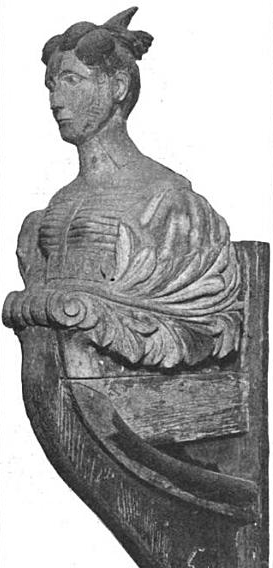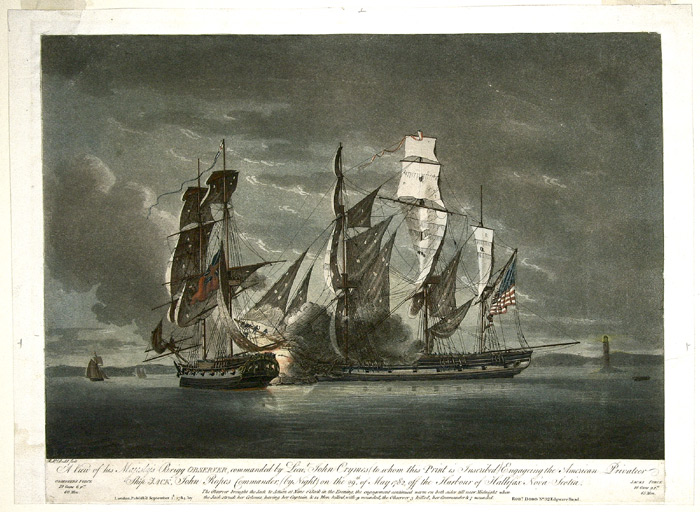- Submitted on
- 3 comments
The arts, literature, and religion provided a plethora of source material for the naming of ships. Characters from history, literature, Greek and Roman mythology, saints, and other religious derivations were very common inspirations in the late eighteenth and early nineteenth century Atlantic World. The classicist movement was influential during this period, and classically inspired names were extremely prevalent among many types of ships. Examples of classical names among ships abounded: Neptune, Juno, Ceres, Pomona, Atlas, Hercules, Argus, Leonidas, Ulysses, Diomedes, Telemachus, Aeolus, Nestor, Nymph, Atalanta, Apollo, Romulus, Mars, Vestal, Orion, Pompey, Cincinnatus, Caesar, Brutus, Lucretia, Herculaneum, and Pythagoras. Saint’s and Biblical names were popular name choices for ships in the Atlantic World as well, such as St. Anne, St. Thomas, St. Michael, and Nimrod.

("Figurehead from a French prize later carried by the American ships Caroline and Maritana . . . In the collection of the Boston Marine Museum", 18th-19th c., Artist unknown, Public Domain via Wikimedia)
Places as names for ships often denoted where the ship (or its owner) originated. The most frequently used types of names included rivers, landmarks, cities (usually ports), trading destinations, battle sites, and aristocratic family seats. There is great difficulty in distinguishing names deriving from geographic places versus noble titles, as they are often one in the same. From the period between 1784 and 1808 in Nova Scotia, among prizes captured were ships named Northumberland, Kingston, Sandwich Packet, Liverpool, Falmouth, Portsmouth, New Orleans, Charleston Packet, Orient, Clyde, Susquehanna, Severn, and Eutaw—likely referring to the Revolutionary Battle of Eutaw Springs, South Carolina, in which the victor was unclear. Among the Nova Scotian privateers of the War of 1812, there was the Shannon, a river in Ireland and also peerage, and Caledonia, a romantic name for Scotland. From a list of the Nova Scotian prizes of the War of 1812, we find city names in the Stockholm, Manchester Packet, Belfast, York Town, Dantzick (Gdańsk), and Jerusalem. Also, the countries of Cuba and Finland were represented along with the poetic names Hibernia, Albion, and Britannia for Ireland, England, and Britain respectively. Bodies of water included the Baltic, Rubicon, and Boyne. The last name was also a critial battle that took place on the river in Ireland in 1690 and contributed to the Protestant ascendancy in the country. Other ships that took the names of battles were the Culloden (the culmination of the Jacobite rising in Scotland in 1746) and Camden (a battle that occurred in 1780 in South Carolina during the American Revolution).
Nature provided inspiration for the next significant category of names. Plants, animals, birds, and water-associated nouns were all found with frequency among ship names across time and place. North American animals were often used for naming ships: Lynx, Porcupine, Anaconda, Lizard, Bee, Wasp, Rattlesnake, Antelope, Beaver, Fox, Stag, Hare, Wolverine, and Weazle. Birds were extremely popular subjects as well: Dove, Swallow, Eagle, Red Bird, Gannet, Lark, Sand Bird, Black Swan, Duck, Landrail, Curlew, Sapwing, Raven, and Night Hawk. Of course, names deriving from the sea itself were very common: Dolphin, Porpoise, Mermaid, and Sea Flower. Astronomical inspiration was also popular among the prize ships of the War of 1812: Zodiac, North Star, Morning Star, Constellation, Eclipse, Hesper, and Eastern Star.

(Aquatint by Robert Dodd, 1784, held by the Beverley Robinson Collection, US Naval Academy, Public domain via Wikimedia Commons).
In the more ethereal name category, ship names were used that represented ideas such as patriotism, positive attributes or characteristics, and linguistic expressions or phrases. Privateer names often denoted speed or aggression and extoled “warlike” virtues that could be downright threatening! From the Nova Scotian privateers circa 1812, many of their names embodied energy: Fly, Intrepid, Herald, Retriever, Dart, and Gleaner. Prizes from the American Revolution through the War of 1812 brought into Halifax, Nova Scotia equally showed this positive spirit in naming: Spritely, Renown, Warrior, Success, Relief, Superb, Hazard, Ranger, Diligence, Gladiator, Volunteer, Brilliant, Hero, Speedy, Heart of Oak, Chase, Reliance, Hunter, Victory, Traveller, Racer, Paragon, Industry, Fortune, Torpedo, Ambition, Resolution, Huntress, Recovery, Flash, Robust, Invincible, Perseverance, Tomahawk, Comet, Success, Favorite, Encouragement, Reward, Protectress, Regulator, Ambition, Adventure, Speedwell, and Blockade.
Names could often hold political significance or represent social movements, or be demonstrative of a new national pride, or even a spirit of reconciliation. Among the American prizes captured and brought into Halifax from 1784 to 1801, post-Revolution, can be found the Independence, Union, Pilgrim, True Republican, Confederacy, National Cockade, Congress, Equality, Faithful, Liberty, Neutrality, Gadsden (the Revolutionary flag), Citizen, Columbia (female personification of the United States), Alliance, Golden Age, Rising Sun, and Fair American. American ships captured during the War of 1812 brought into Halifax included the President, Mayflower, Hope for Peace, Unity, Armistice, Policy, Patriot, and Federal.
Economic hopes were often embodied in ship names, whose primary purpose was usually trade. Prizes from 1784-1808 brought to Halifax from 1784 to 1813 related to economic success included: Commerce, Chance, Harmony, Industry, Enterprize, Endeavour, Financier, Legal Tender, Economy, Specie, Fortune, and Merchant.
Ship names could derive from almost any source, and there are many interesting cases, sometimes using plays on words or showing a sense of humour. During the War of 1812, causes with interesting names included Allegation, Quiz, Tickler, Gift, Cod Hook, Good Luck, and Better Luck Still!
Although an examination of the names of ships is interesting in and of itself, by tracing particular vessels to their original owners and builders, a sense of what their beliefs and goals were at the time of the christening can be gathered. Ship names hold a unique position of esteem in in the Atlantic World, capturing the essence of life at sea and the aspirations of both new and old nations.
Leah Grandy holds a PhD in History and works as a Microforms Assistant at the Harriet Irving Library.
Primary Sources Used- The Loyalist Collection
Great Britain, High Court of Admiralty, Letters of Marque: Declarations Against America: 1777-1783. (See created index of ships under “Electronic Finding Aid Record.”)
Nova Scotia, Court of Vice-Admiralty, Records: 1763-1867. (See created index of ships under “Electronic Finding Aid Record.”)
United States, Department of State, War of 1812 Papers: 1789-1815. (See created ship and document list under “Electronic Finding Aid Record.”)
Recommended Secondary Sources
John Frayler, “What’s In a Name?,” Pickled Fish and Salted Provisions: Historical Musings from Salem Maritime NHS, (November 2006), Vol. VII, No. 3.
Faye Margaret Kert, Prize and Prejudice: Privateering and Naval Prize in Atlantic Canada in the War of 1812, Saint John’s, Newfoundland: International Maritime Economic History Association, 1997.
T. D. Manning, British Warship Names, London: Putnam, 1959.
Timothy S. Good, ed., American Privateers in the War of 1812: The Vessels and Their Prizes as Recorded in Niles’ Weekly Register, Jefferson, North Carolina: McFarland & Co. Inc., Pubs., 2012.
Michael Seymour, “Warships’ Names of the English Republic, 1649-1659,” Mariner’s Mirror, November 1990, vol. 76, 4, pp. 317-324.

Comments Add comment
Ship's name in a New Brunswick family name
Maidstone
Thank you for this interesting reversal, where a person was named after a ship in New Brunswick!
Tristram Hillmam
Add new comment Comments